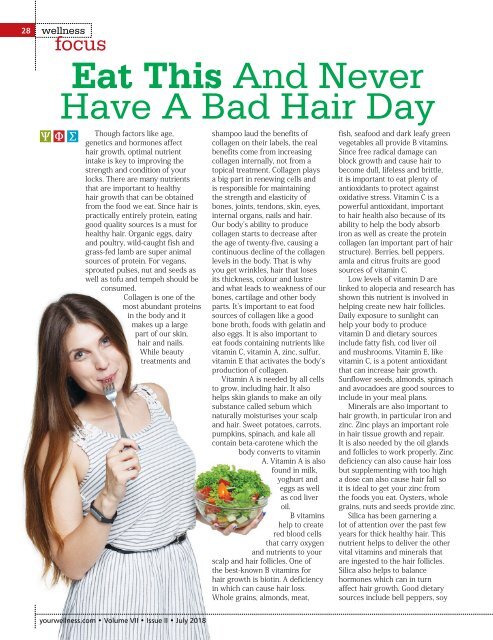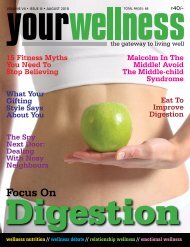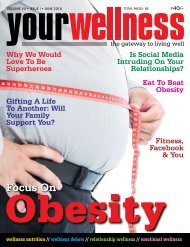YW_Issue_94_July-18_68 pages
Create successful ePaper yourself
Turn your PDF publications into a flip-book with our unique Google optimized e-Paper software.
28 wellness<br />
focus<br />
Eat This And Never<br />
Have A Bad Hair Day<br />
Though factors like age,<br />
genetics and hormones affect<br />
hair growth, optimal nutrient<br />
intake is key to improving the<br />
strength and condition of your<br />
locks. There are many nutrients<br />
that are important to healthy<br />
hair growth that can be obtained<br />
from the food we eat. Since hair is<br />
practically entirely protein, eating<br />
good quality sources is a must for<br />
healthy hair. Organic eggs, dairy<br />
and poultry, wild-caught fish and<br />
grass-fed lamb are super animal<br />
sources of protein. For vegans,<br />
sprouted pulses, nut and seeds as<br />
well as tofu and tempeh should be<br />
consumed.<br />
Collagen is one of the<br />
most abundant proteins<br />
in the body and it<br />
makes up a large<br />
part of our skin,<br />
hair and nails.<br />
While beauty<br />
treatments and<br />
shampoo laud the benefits of<br />
collagen on their labels, the real<br />
benefits come from increasing<br />
collagen internally, not from a<br />
topical treatment. Collagen plays<br />
a big part in renewing cells and<br />
is responsible for maintaining<br />
the strength and elasticity of<br />
bones, joints, tendons, skin, eyes,<br />
internal organs, nails and hair.<br />
Our body’s ability to produce<br />
collagen starts to decrease after<br />
the age of twenty-five, causing a<br />
continuous decline of the collagen<br />
levels in the body. That is why<br />
you get wrinkles, hair that loses<br />
its thickness, colour and lustre<br />
and what leads to weakness of our<br />
bones, cartilage and other body<br />
parts. It’s important to eat food<br />
sources of collagen like a good<br />
bone broth, foods with gelatin and<br />
also eggs. It is also important to<br />
eat foods containing nutrients like<br />
vitamin C, vitamin A, zinc, sulfur,<br />
vitamin E that activates the body’s<br />
production of collagen.<br />
Vitamin A is needed by all cells<br />
to grow, including hair. It also<br />
helps skin glands to make an oily<br />
substance called sebum which<br />
naturally moisturises your scalp<br />
and hair. Sweet potatoes, carrots,<br />
pumpkins, spinach, and kale all<br />
contain beta-carotene which the<br />
body converts to vitamin<br />
A. Vitamin A is also<br />
found in milk,<br />
yoghurt and<br />
eggs as well<br />
as cod liver<br />
oil.<br />
B vitamins<br />
help to create<br />
red blood cells<br />
that carry oxygen<br />
and nutrients to your<br />
scalp and hair follicles. One of<br />
the best-known B vitamins for<br />
hair growth is biotin. A deficiency<br />
in which can cause hair loss.<br />
Whole grains, almonds, meat,<br />
fish, seafood and dark leafy green<br />
vegetables all provide B vitamins.<br />
Since free radical damage can<br />
block growth and cause hair to<br />
become dull, lifeless and brittle,<br />
it is important to eat plenty of<br />
antioxidants to protect against<br />
oxidative stress. Vitamin C is a<br />
powerful antioxidant, important<br />
to hair health also because of its<br />
ability to help the body absorb<br />
iron as well as create the protein<br />
collagen (an important part of hair<br />
structure). Berries, bell peppers,<br />
amla and citrus fruits are good<br />
sources of vitamin C.<br />
Low levels of vitamin D are<br />
linked to alopecia and research has<br />
shown this nutrient is involved in<br />
helping create new hair follicles.<br />
Daily exposure to sunlight can<br />
help your body to produce<br />
vitamin D and dietary sources<br />
include fatty fish, cod liver oil<br />
and mushrooms. Vitamin E, like<br />
vitamin C, is a potent antioxidant<br />
that can increase hair growth.<br />
Sunflower seeds, almonds, spinach<br />
and avocadoes are good sources to<br />
include in your meal plans.<br />
Minerals are also important to<br />
hair growth, in particular iron and<br />
zinc. Zinc plays an important role<br />
in hair tissue growth and repair.<br />
It is also needed by the oil glands<br />
and follicles to work properly. Zinc<br />
deficiency can also cause hair loss<br />
but supplementing with too high<br />
a dose can also cause hair fall so<br />
it is ideal to get your zinc from<br />
the foods you eat. Oysters, whole<br />
grains, nuts and seeds provide zinc.<br />
Silica has been garnering a<br />
lot of attention over the past few<br />
years for thick healthy hair. This<br />
nutrient helps to deliver the other<br />
vital vitamins and minerals that<br />
are ingested to the hair follicles.<br />
Silica also helps to balance<br />
hormones which can in turn<br />
affect hair growth. Good dietary<br />
sources include bell peppers, soy<br />
yourwellness.com • Volume VII • <strong>Issue</strong> II • <strong>July</strong> 20<strong>18</strong>




